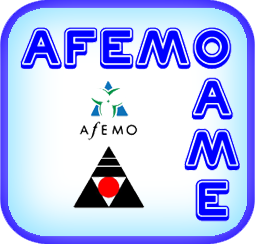

Grade 4 Resources
Overall Lesson Webinar Recording Webinar Support Lesson Support
Select All Clear All
Students will use a mathematical model to help them determine the best in-game purchases to make in a fictional video game scenario.
Use coded directions to perform translations on a grid.
Use physical movements and block coding to create repeating patterns to describe translations (sequential and loops).
Introduction to coding on a Cartesian plane using ordered pairs in the first quadrant; paper grid (unplugged coding) and Scratch
Students will create a coding formula in Scratch to find the area of a rectangle so they can paint the walls of the classroom. This lesson addresses multiple expectations in Spatial Sense and Financial Literacy.
Use mathematical vocabulary to make predictions of a probability (heads or tails) and use a code (Scratch) to represent this situation.
Use estimation strategies and operations to determine the best price for bundled items by finding unit rate.
In this lesson, students continue to analyze, evaluate, and modify as necessary their mathematical model presented in Lesson 1 (Planning the School Breakfast Club). They have the opportunity to collect and interpret additional data to answer further questions, create new models, and seek practical solutions to the given situation.
Create drawings to understand the meaning of the numerator and denominator in fractions written in standard notation.
In this lesson, students will count unit fractions to help them represent the relationship between repeated addition of unit fractions and multiplication of those same unit fractions by a whole number.
In this lesson, students will have the chance to compare fractions in two different fair-share scenarios. They can compare them by using drawings and models to compare them.
This lesson is the first of two. Students begin the first three steps of the mathematical modeling process: understanding the situation, analyzing the situation, and creating a mathematical model. From an authentic activity, students work together to come up with a simple model and collect the data. This lesson will be followed by a second lesson called Let's Serve Breakfast! where students continue the mathematical modeling process.
In this lesson, students will think about the factors that influence their decisions when making a purchase. Teachers can explore two scenarios (buying an article that they want and buying an article that they really need). Students will be able to make a decision and justify their choice using factors that can influence spending and saving behaviors.
A continuum from Grades 1-8 outlining the key coding concepts per grade coupled with a Scratch project with teacher notes.
A bilingual compilation of pertinent vocabulary directly related to computational thinking and computer programming/coding.
A summary of Virtual Manipulatives for Fractions that are available, including links, and considerations for their usage.
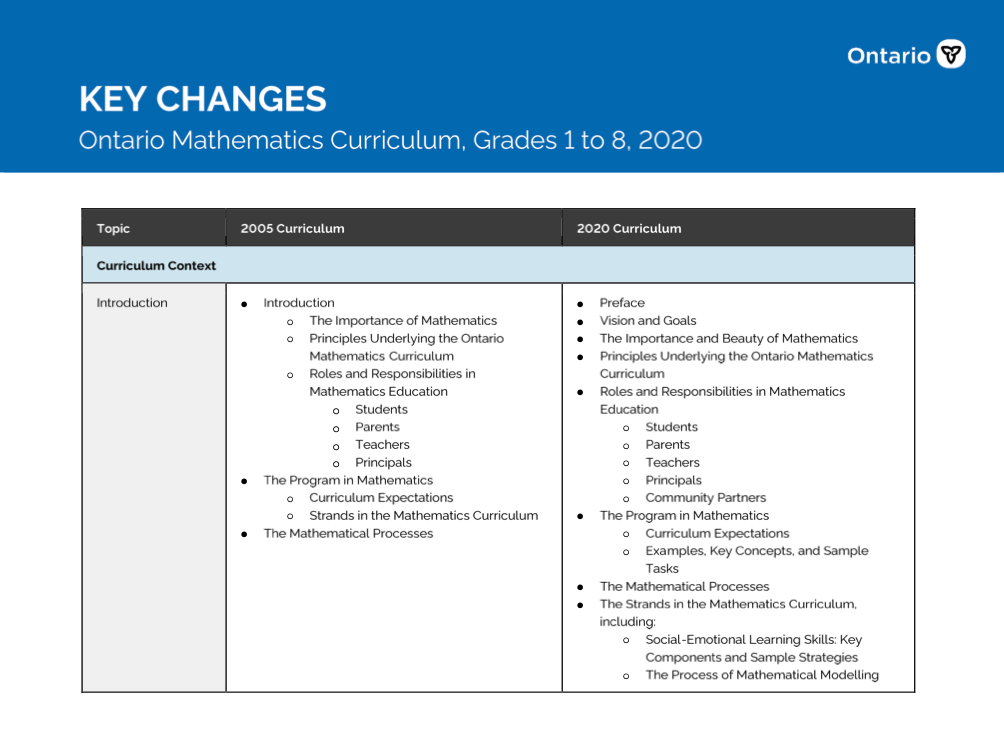 Key Changes - Ontario Mathematics Curriculum, Grades 1 to 8, 2020
[PDF]
Key Changes - Ontario Mathematics Curriculum, Grades 1 to 8, 2020
[PDF]
This document, prepared by the Ontario Ministry of Education, compares in table form the key changes between the 2005 and the 2020 elementary mathematics curriculum.
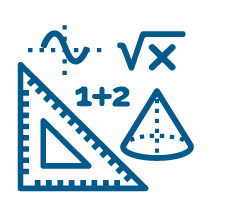 Ontario Mathematics Curriculum, 2020, Grades 1 - 8
[URL]
Ontario Mathematics Curriculum, 2020, Grades 1 - 8
[URL]
This curriculum policy replaces The Ontario Curriculum, Grades 1-8: Mathematics, 2005. Beginning in September 2020, all mathematics programs for Grades 1 to 8 will be based on the expectations outlined in this curriculum policy.
Welcome to this webinar about coding in the mathematics curriculum. We will be taking you through the pedagogy and social emotional learning skills that coding brings to your classroom as well as the lessons that have been created as supports for Ontario teachers in the Junior grades.
NOTE: This recording does not yet contain the Q&A section - those will be added soon from all the recordings with captioning.
Welcome to this webinar about teaching the Number expectations for the junior grades of the revised mathematics curriculum. In this webinar, we take you through the lessons that have been created by Ontario educators to support Ontario educators. These Number lessons have a focus on developing fraction concepts and skills. These lessons benefit from the latest research about learning fractions, including an emphasis on high-yield visual representations.
Welcome to this webinar about teaching the new Financial Literacy expectations for the junior grades of the revised mathematics curriculum. In this webinar, we take you through the lessons that have been created by Ontario educators to support Ontario educators. In developing the Financial Literacy lessons for this project, the intentional decision to use scenarios was made. Scenarios give the opportunity to have a discussion about financial choices and the inequities of access to those choices. The goal was to provide students with a chance to learn and understand the individual skills needed that impact personal financial choices and also the economic literacy needed to understand the impact of financial systems as a whole.
Welcome to this webinar about teaching the new Mathematical Modelling expectations for the junior grades of the revised mathematics curriculum. In this webinar, we take you through the lessons that have been created by Ontario educators to support Ontario educators. These Mathematical Modelling lessons have a focus on developing students’ appreciation for the role mathematics plays in real “real life” while providing students with opportunities to experience mathematics in a more personal and relevant way.
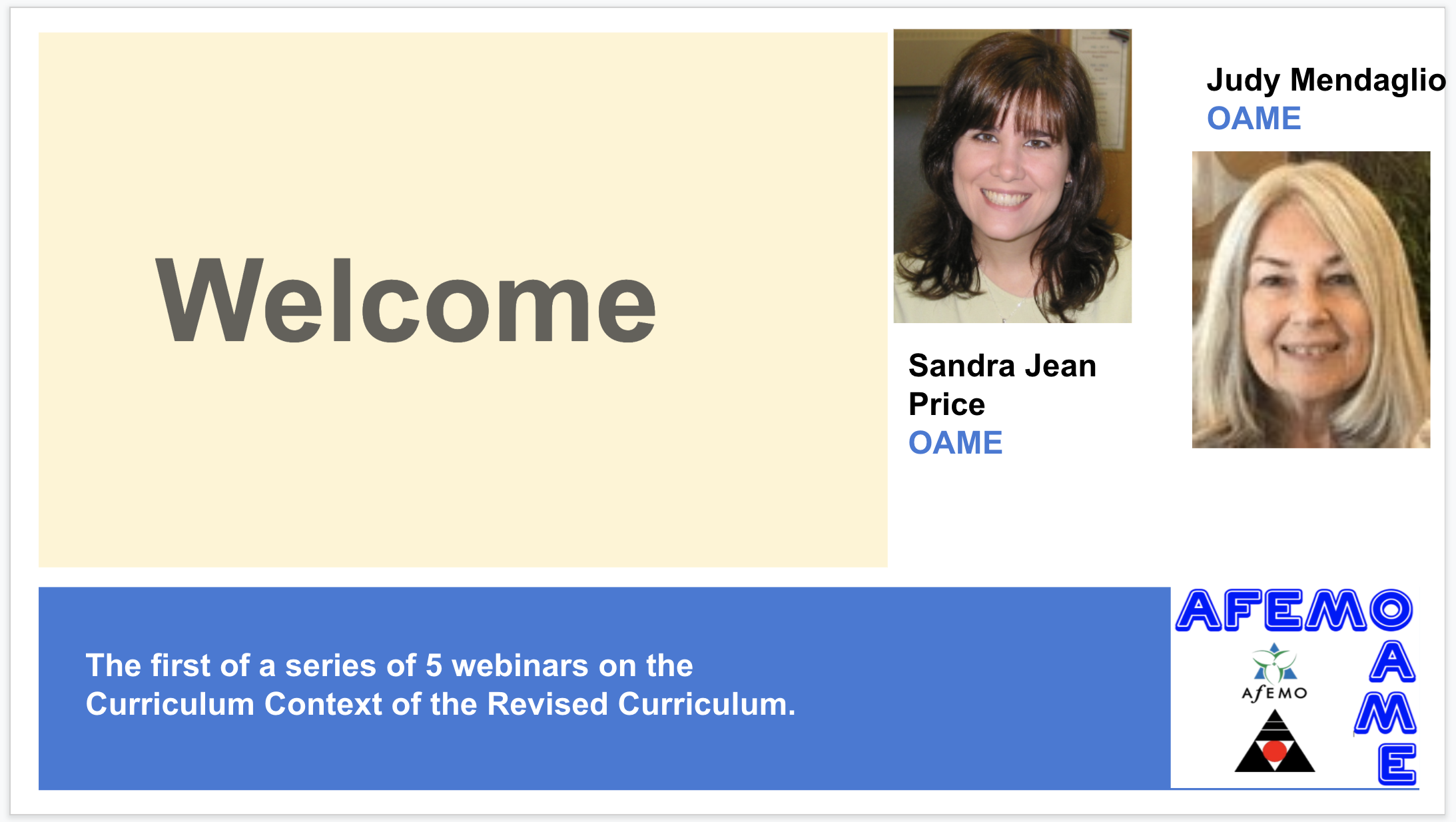 Webinar 1 - Vision, Goals, and Strands
[MP4]
Webinar 1 - Vision, Goals, and Strands
[MP4]
This hour-long webinar will outline the vision, goals and strands of the revised Ontario Elementary Mathematics Curriculum. In this webinar, we will unpack these very important sections of the Curriculum Context of the revised curriculum, providing educators with an introduction as to how this "front matter" has expanded and what these changes mean to educators as they plan their math programs. We will also give an overview of the changes in the curriculum, particularly as they relate to the strands.
Also available:
* the slides for this presentation, in Google Slides format.
* links and resources document, "Resources for Curriculum Context Webinar 1" , comprising links to research, videos, audio, and websites which may be of use to you as you continue to explore the Vision, Goals, and Strands in the Revised Elementary Math Curriculum (2020). [Google Doc]
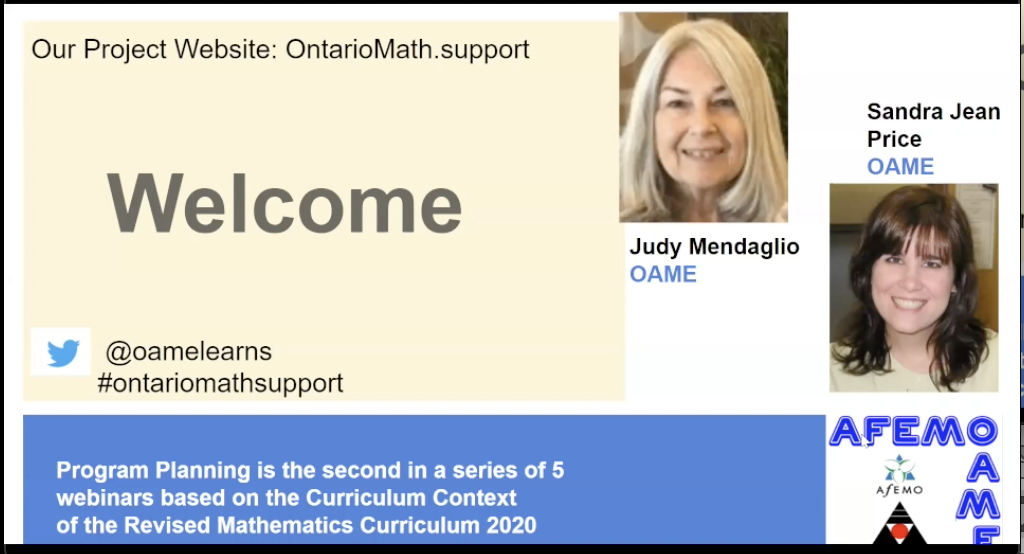 Webinar 2 - Program Planning
[MP4]
Webinar 2 - Program Planning
[MP4]
This hour-long webinar will focus on program planning for the revised Elementary Mathematics Curriculum. In this webinar, we will explore the contents of the Program Planning section of the “Curriculum Context”, and provide educators with an introduction to what these changes mean to educators as they plan their math programs.
Also available:
* the slides for this presentation, in Google Slides format.
* links and resources document, "Resources for Curriculum Context Webinar 2" , comprising links to research, videos, audio, and websites which may be of use to you as you continue to learn more about the considerations for program planning found in the Revised Elementary Math Curriculum (2020). [Google Doc]
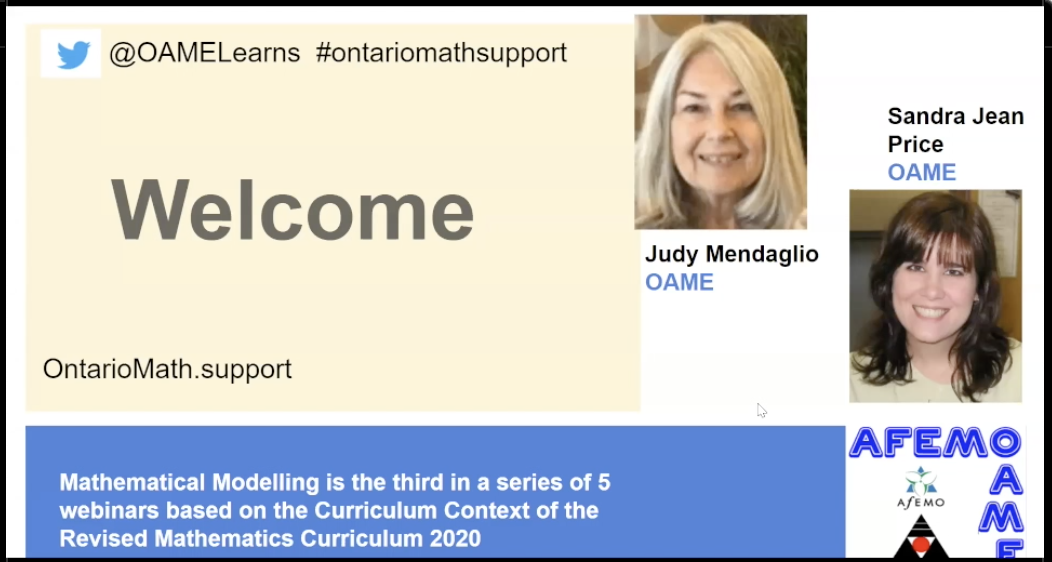 Webinar 3 - Mathematical Modelling
[MP4]
Webinar 3 - Mathematical Modelling
[MP4]
This hour-long webinar will focus on Mathematical Modelling. In this webinar, we will explore in detail what the mathematical modelling process looks like and how it is truly new to the curriculum. We hope to deepen educators’ understanding of what Mathematical Modelling is and how it can be woven into a math program. Sample tasks will be discussed.
Also available:
* the slides for this presentation, in Google Slides format.
* links and resources document, "Resources for Curriculum Context Webinar 3", comprising links to research, videos, audio, and websites which may be of use to you as you continue to learn more about the Mathematical Modelling process.
 Webinar 4 - Social-Emotional Learning (SEL) Skills in Mathematics and the Mathematical Processes
[MP4]
Webinar 4 - Social-Emotional Learning (SEL) Skills in Mathematics and the Mathematical Processes
[MP4]
This hour-long webinar focuses on Social-Emotional Learning Skills in Mathematics & the Mathematical Processes. Examine this strand in more detail, and look at connecting SEL Skills, Mathematical Processes, and assessment and instruction of the remaining five strands.
Also available:
* link and resources document, "Resources for Curriculum Context Webinar 4: Strand A - Social-Emotional Learning Skills in Mathematics and the Mathematical Processes", you will find links to research, videos, audio, and websites which may be of use to you as you continue to learn more about SES and the Mathematical Processes.
 Webinar 5 - Assessment and Evaluation
[MP4]
Webinar 5 - Assessment and Evaluation
[MP4]
This hour-long webinar focuses on Assessment and Evaluation. Revisit assessment and evaluation of student learning in light of the revised elementary math curriculum and its expanded Curriculum Context.
Also available:
* link and resources document, "Resources for Curriculum Context Webinar 5: Assessment and Evaluation", you will find links to research, videos, audio, and websites which may be of use to you as you continue to learn more about this topic.
Welcome to this webinar about coding in the mathematics curriculum. We will be taking you through the pedagogy and social emotional learning skills that coding brings to your classroom as well as the lessons that have been created as supports for Ontario teachers in the Junior grades.
NOTE: This recording does not yet contain the Q&A section - those will be added soon from all the recordings with captioning.
Welcome to this webinar about teaching the new coding expectations for the intermediate grades of the revised mathematics curriculum. We will be taking you through the lessons that have been created as supports for Ontario educators as well as the pedagogy and social emotional learning skills that coding brings to your classroom.
NOTE: This recording does not yet contain the Q&A section - those will be added soon from all the recordings with captioning.
Welcome to this webinar about coding in the mathematics curriculum. We will be taking you through the pedagogy and social emotional learning skills that coding brings to your classroom as well as the lessons that have been created as supports for Ontario teachers in the primary grades.
NOTE: This recording does not yet contain the Q&A section - those will be added soon from all the recordings with captioning.
Welcome to this webinar about teaching the new Financial Literacy expectations for the primary grades of the revised mathematics curriculum. In this webinar, we take you through the lessons that have been created by Ontario educators to support Ontario educators. In developing the Financial Literacy lessons for this project, the intentional decision to use scenarios-based tasks was made. The goal of the lessons were to provide real-life contexts for students to develop their understanding of money concepts, as an individual and a community.
Welcome to this webinar about teaching the Number expectations for the primary grades of the revised mathematics curriculum. In this webinar, we take you through the lessons that have been created by Ontario educators to support Ontario educators. These Number lessons have a focus on developing fraction concepts and skills. These lessons benefit from the latest research about learning fractions, including an emphasis on high-yield visual representations.
Welcome to this webinar about teaching the new Mathematical Modelling expectations for the primary grades of the revised mathematics curriculum. In this webinar, we take you through the lessons that have been created by Ontario educators to support Ontario educators. These Mathematical Modelling lessons have a focus on developing students’ appreciation for the role mathematics plays in real “real life” while providing students with opportunities to experience mathematics in a more personal and relevant way.
Welcome to this webinar about teaching the new Financial Literacy expectations for the junior grades of the revised mathematics curriculum. In this webinar, we take you through the lessons that have been created by Ontario educators to support Ontario educators. In developing the Financial Literacy lessons for this project, the intentional decision to use scenarios was made. Scenarios give the opportunity to have a discussion about financial choices and the inequities of access to those choices. The goal was to provide students with a chance to learn and understand the individual skills needed that impact personal financial choices and also the economic literacy needed to understand the impact of financial systems as a whole.
Welcome to this webinar about teaching the Number expectations for the junior grades of the revised mathematics curriculum. In this webinar, we take you through the lessons that have been created by Ontario educators to support Ontario educators. These Number lessons have a focus on developing fraction concepts and skills. These lessons benefit from the latest research about learning fractions, including an emphasis on high-yield visual representations.
Welcome to this webinar about teaching the new Mathematical Modelling expectations for the junior grades of the revised mathematics curriculum. In this webinar, we take you through the lessons that have been created by Ontario educators to support Ontario educators. These Mathematical Modelling lessons have a focus on developing students’ appreciation for the role mathematics plays in real “real life” while providing students with opportunities to experience mathematics in a more personal and relevant way.
Welcome to this webinar about teaching the new Financial Literacy expectations for the intermediate grades of the revised mathematics curriculum. In this webinar, we take you through the lessons that have been created by Ontario educators to support Ontario educators. In developing the Financial Literacy lessons for this project, the intentional decision to use scenarios was made. Scenarios give the opportunity to have a discussion about financial choices and the inequities of access to those choices. The goal was to provide students with a chance to learn and understand the individual skills needed that impact personal financial choices and also the economic literacy needed to understand the impact of financial systems as a whole.
Welcome to this webinar about teaching the Number expectations for the intermediate grades of the revised mathematics curriculum. In this webinar, we take you through the lessons that have been created by Ontario educators to support Ontario educators. These Number lessons have a focus on developing fraction concepts and skills. These lessons benefit from the latest research about learning fractions, including an emphasis on high-yield visual representations.
Welcome to this webinar about teaching the new Mathematical Modelling expectations for the intermediate grades of the revised mathematics curriculum. In this webinar, we take you through the lessons that have been created by Ontario educators to support Ontario educators. These Mathematical Modelling lessons have a focus on developing students’ appreciation for the role mathematics plays in real “real life” while providing students with opportunities to experience mathematics in a more personal and relevant way.
This webinar will introduce Ontario educators to three (3) course plans, each of which outlines a different way a teacher could structure the 2021 Grade 9 math course. These course plans have been shared on our OntarioMath.support website. Each course plan includes all of the curriculum expectations, providing suggestions as to how to group expectations to present mathematics in Grade 9 as a connected whole. In addition to providing ways to structure the course, each plan offers ideas for questions and tasks that will engage students with the mathematics they are learning. In this webinar, we will also outline the underlying principles upon which all three course plans have been designed to provide support for teachers as they implement a de-streamed grade 9 curriculum.
Also available: In "Resources related to Course Planning Webinar", you will find links to research, videos, audio, and websites which may be of use to you as you continue to learn more about Course Planning and the Revised Math Curriculum (2021).
This document is a Google Doc, in View Only mode. If desired, you can use File -> Download, or File -> Make a copy, to save a version for yourself.
August 2021
In this webinar about the transition from the revised elementary mathematics curriculum (2020) to the newly revised Grade 9 mathematics curriculum (2021), participants will receive specific information about the alignment of expectations for grades 7, 8, and 9. They will also receive guidance on approaches to course planning as well as lesson and assessment planning. References and resources available to support teachers will be shared. A Question and Answer period will be included in this webinar.
Also available: In "Resources for Secondary Transitions Webinar", you will find links to research, videos, audio, and websites which may be of use to you as you continue to learn more about the Revised Math Curriculum (2021).
This document is a Google Doc, in View Only mode. If desired, you can use File -> Download, or File -> Make a copy, to save a version for yourself.
How are de-streamed classrooms different? How must instruction and assessment be shifted to accommodate these differences? In this webinar, we will talk about the goal of ensuring success for ALL our students, as well as considerations and ideas that will support teachers as they plan their math programs.
Also available: In "Resources related to De-Streaming for Success Webinar", you will find links to research, videos, audio, and websites which may be of use to you as you continue to learn more about De-streaming and the Revised Math Curriculum (2021).
This document is a Google Doc, in View Only mode. If desired, you can use File -> Download, or File -> Make a copy, to save a version for yourself.
Creating a safe and inclusive learning environment, one that encourages student collaboration and student choice, is critical to successfully implementing the 2021 de-streamed mathematics program. In this webinar, we will share practical strategies for meeting the challenges of teaching this new curriculum while ensuring equity and inclusivity, bringing student voice and student lived experiences into the mathematics learning.
Also available: In "Resources related to Shaping the Learning Environment Webinar", you will find links to research, videos, audio, and websites which may be of use to you as you continue to learn more about the Revised Math Curriculum (2021).
This document is a Google Doc, in View Only mode. If desired, you can use File -> Download, or File -> Make a copy, to save a version for yourself.
“In Grade 9, students transition to using coding as a tool to interact with the mathematics they are learning. They use the skills developed in elementary to create and alter code in a multitude of coding environments including text-based programming languages, spreadsheets, computer algebra systems (CAS), and virtual graphing and geometry tools.” (2021 MTH1W)
What do students know about coding coming into Grade 9? How am I supposed to teach coding as well as all the other math expectations? How can I support students when I don’t know how to code? If you’ve asked yourself some of these questions, come to this webinar to explore some answers.
Also available: In "Resources: Strand A - Mathematical Thinking and Making Connections through Coding", you will find links to research, videos, audio, and websites which may be of use to you as you continue to learn more about the Revised Math Curriculum (2021).
This document is a Google Doc, in View Only mode. If desired, you can use File -> Download, or File -> Make a copy, to save a version for yourself.
This hour-long webinar will focus on how the process of Mathematical Modelling, integrated with Grade 9 math concepts, can effectively support student development of strong mathematical thinking skills. In this webinar, we will explore in detail what the mathematical modelling process looks like and how it naturally builds connections between math and other disciplines, as well as between math and students' own cultures and communities. We hope to deepen educators’ understanding of what Mathematical Modelling is and how it can be woven into a math program. Sample tasks will be discussed.
Also available: In "Resources: Strand A - Mathematical Thinking and Making Connections through Mathematical Modelling", you will find links to research, videos, audio, and websites which may be of use to you as you continue to learn more about the Revised Math Curriculum (2021).
This document is a Google Doc, in View Only mode. If desired, you can use File -> Download, or File -> Make a copy, to save a version for yourself.
Students in Ontario are navigating a complex world driven by data. Our world is evolving and new fields and careers are emerging that require individuals with high levels of data literacy. Supporting students as they develop critical data literacy skills is an essential component of the new de-streamed Grade 9 curriculum. Data literacy is different from data management. Certainly, data management skills are important to analyse data. As part of the revised elementary mathematics curriculum in 2020, students have been building their data management skills. How do we connect these with the larger goal of achieving data literacy? What are the competencies necessary for data literacy, and how will we continue to build these competencies to ensure that all students leave our schools as data literate young adults? In this webinar, we will talk more about these competencies, and we will share strategies for integrating data literacy into the teaching of each of the math strands.
Also available: In "Resources: Data Literacy Across the Strands", you will find links to research, videos, audio, and websites which may be of use to you as you continue to learn more about the Revised Math Curriculum (2021).
This document is a Google Doc, in View Only mode. If desired, you can use File -> Download, or File -> Make a copy, to save a version for yourself.


